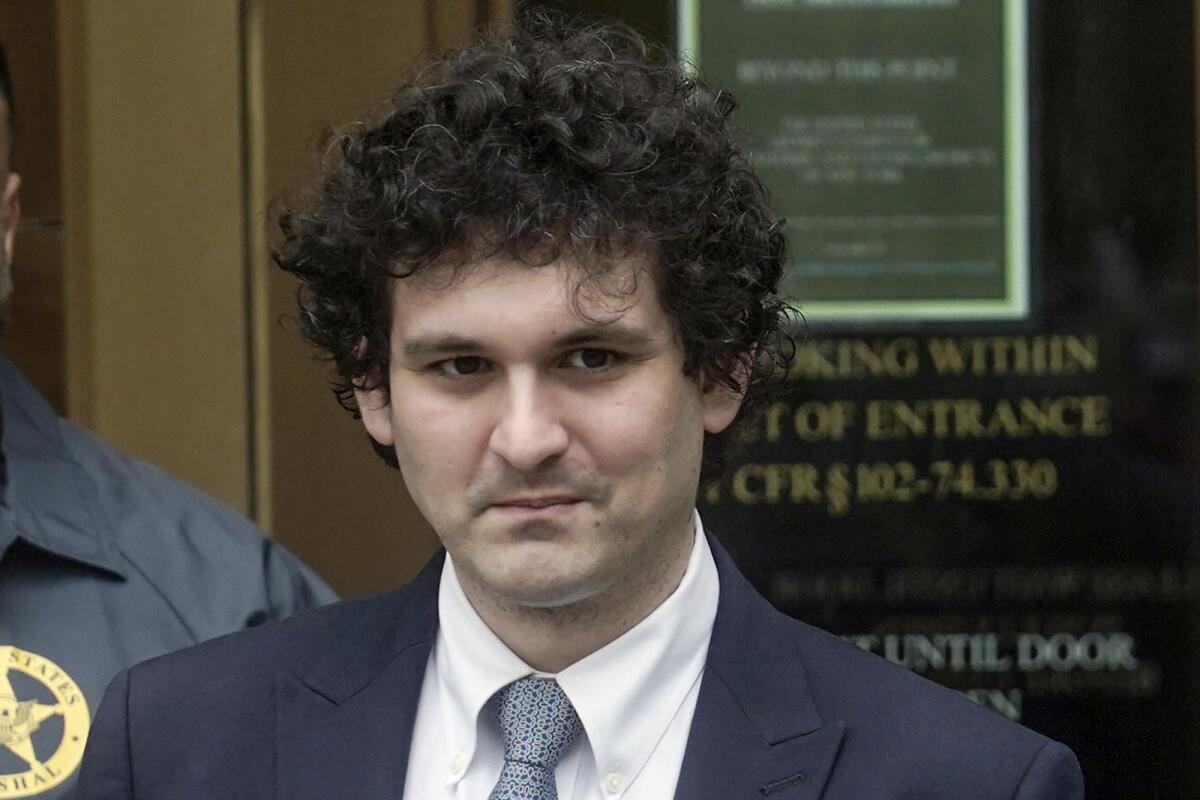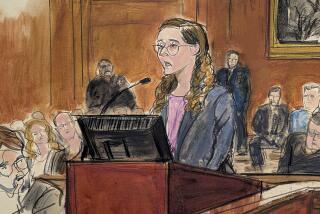Sam Bankman-Fried is jailed; judge revokes bail, says crypto mogul tampered with witnesses

- Share via
NEW YORK — FTX founder Sam Bankman-Fried left a federal courtroom in handcuffs Friday after a judge revoked his bail after concluding that the fallen cryptocurrency wiz had repeatedly tried to influence witnesses against him.
Bankman-Fried looked down at his hands as Judge Lewis A. Kaplan explained at length why he believed that Bankman-Fried had repeatedly pushed the boundaries of his $250-million bail package to a point that Kaplan could no longer ensure the protection of the community, including prosecutors’ witnesses, unless the 31-year-old was behind bars.
At the conclusion of the hearing, Bankman-Fried took off his suit jacket and tie and turned his watch and other personal belongings over to his lawyers. The clanging of handcuffs could be heard as his hands were cuffed in front of him. He was then led out of the courtroom by U.S. marshals.
It was a spectacular fall for a man once viewed by many as a savvy crypto visionary who had testified before Congress and hired celebrities including Larry David, Tom Brady and Stephen Curry to promote his businesses.
Kaplan said there was probable cause to believe Bankman-Fried had tried to “tamper with witnesses at least twice” since his December arrest, most recently by showing a journalist the private writings of a former girlfriend and key witness against him and also in January when he reached out to FTX’s general counsel with an encrypted communication.
The judge said he concluded there was a probability that Bankman-Fried had tried to influence both anticipated trial witnesses “and quite likely others whose names we don’t even know” to get them to “back off, to have them hedge their cooperation with the government.”
Bankman-Fried’s lawyers insisted that their client’s motives were innocent and he shouldn’t be jailed for trying to protect his reputation against a barrage of unfavorable news stories.
Attorney Mark Cohen asked the judge to suspend his incarceration order for an immediate appeal, but Kaplan rejected the request. Within an hour, defense lawyers filed a notice of appeal.
Bankman-Fried had been under house arrest at his parents’ home in Palo Alto, Calif., since his December extradition from the Bahamas on charges that he defrauded investors in his businesses and illegally diverted millions of dollars’ worth of cryptocurrency from customers using his FTX exchange.
Indicted crypto billionaire Sam Bankman-Fried’s $250-million bail deal was the largest ever, secured with his parents’ house. But they aren’t typical homeowners.
His bail package severely restricted his internet and phone usage.
The judge noted that the strict rules did not stop Bankman-Fried from reaching out in January to a top FTX lawyer, saying he “would really love to reconnect and see if there’s a way for us to have a constructive relationship, use each other as resources when possible, or at least vet things with each other.”
At a February hearing, Kaplan said the communication “suggests to me that maybe he has committed or attempted to commit a federal felony while on release.” On Friday, Kaplan said he was rejecting defense claims that the communication was benign.
Sam Bankman-Fried, the founder and former chief executive of FTX, has been unusually talkative following the November collapse of the cryptocurrency exchange and his subsequent indictment on fraud and other charges.
Two weeks ago, prosecutors surprised Bankman-Fried’s attorneys by demanding his incarceration, saying he violated rules by showing the New York Times the private writings of Caroline Ellison, his former girlfriend and the ex-CEO of Alameda Research, a cryptocurrency trading hedge fund that was one of his businesses.
Prosecutors said he was trying to sully her reputation and influence prospective jurors who might be summoned for his October trial.
Ellison pleaded guilty in December to criminal charges carrying a potential penalty of 110 years in prison. She has agreed to testify against Bankman-Fried as part of a deal that could lead to a more lenient sentence.
Bankman-Fried’s lawyers argued he probably failed in a quest to defend his reputation because the article cast Ellison in a sympathetic light. They also said prosecutors exaggerated the role Bankman-Fried had in the article.
They said prosecutors were trying to get their client locked up by offering evidence consisting of “innuendo, speculation, and scant facts.”
Since prosecutors made their detention request, Kaplan had imposed a gag order barring public comments by people participating in the trial, including Bankman-Fried.
David McCraw, a lawyer for the New York Times, had written to the judge, noting the 1st Amendment implications of any blanket gag order, as well as public interest in Ellison and her cryptocurrency trading firm.
Ellison confessed to a central role in a scheme defrauding investors of billions of dollars that went undetected, McCraw said.
“It is not surprising that the public wants to know more about who she is and what she did and that news organizations would seek to provide to the public timely, pertinent and fairly reported information about her, as the Times did in its story,” McCraw said.
More to Read
Inside the business of entertainment
The Wide Shot brings you news, analysis and insights on everything from streaming wars to production — and what it all means for the future.
You may occasionally receive promotional content from the Los Angeles Times.












